新目标_八年级下册_第二单元_讲义
人教新目标版八年级英语下册Unit2SectionB1a-1e听说课公开课课件课件

Test yourself !
Preview test
Task 2. Fill in the blanks. 注意:名词单复数,动词时态(三单,
过去式) 结构(to do\doing sth.)
A boy _t_a_k_e_s_a_f_te_r__(像) Ma Yun.
His bike’sw_h_e_e_l_s_(轮子) are _b_r_o_k_e_n_(坏了).
Step 4 post-reading
Task 1: Retell the passage according to the pictures.
① found
③ gave away
② fixed up
④ has run out of
I have run out of money. Could you help me?
①take after 指的是“(在外貌、性格方面)与…像”不管是名词还是 代词只能放在其后,通常用于有血缘关系。 ②look like “长得像,看起来像”,(只指外表) ③be like “像…”,多指性格像,也可指外表像。 ④be similar to“与…类似”,一般都是在相近似的物品和情境的对比。 ⑤ be the same as“与…完全相同”。
wheels.
TF
2. Jimmygasveellasway bikes.
TF
3. Jimmy takes after his mfaoththerer. T F
4. Jimmy has run out of money. T F
Task 2 Listen again and fill in the blanks.
What can you see in the pictures? Try to describe them.
人教新目标版英语八年级下册Unit2SectionB2a-3b课件

Free talk
Should we help each other? Why? Do you often get some help from others in our daily life?
Group work
How do you usually thank someone who helps you? Discuss this with a partner. For example
4. imagine (v. / n.) I can hardly imagine such a scene. 5. difficulties (n. / adj.) Whenever we met with difficulties, they came to help us. 6. normal (adv. / adj.) It’s normal to feel nervous before an exam. 7. training (adv. / n.) His training fits him for the job. 8. kindness (n. / v.) He did it all out of kindness.
I want to take part in this group. 2. disabled (adj. / adv.)
Ada is always ready to help disabled people. 3. difference (adv. / n.)
I volunteer because I want not just to see the world, but to make a difference in it.
Task 4
2d Use the information in the letter to make true sentences by matching the different parts.
人教新目标版八年级英语下册Unit2SectionA(3a-3c)课件
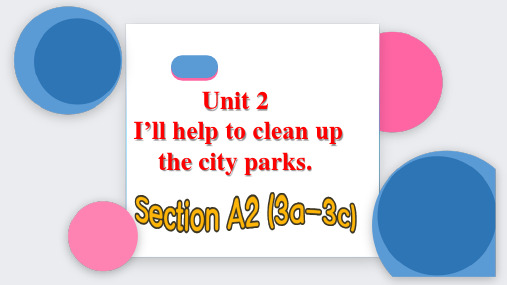
put up signs hand out some notices give out some food
help to clean up the neighborhood
volunteer to work in Hubei
Let’s predict What’s the passage mainly about?
1.What does Mary volunteer to do? She volunteers to help kids learn to read.
2.Why does she try out for a volunteer after-school reading program? Because volunteering here is a dream come true for her.
at an after-school reading program. She still works there _to_h_e_lp__
kids learn to read. Mary _h_a_s a dream job because she can do what she loves _t_o_ _d__o and helps others _a_t_ the same time.
Unit 2 I’ll help to clean up
the city parks.
一、教学目标 1.学习并掌握本节课单词及短语 2.阅读短文,获得相关的信息。 通过阅读练习来提高阅读能力。 3.能意识到尽己所能、帮助他人、乐于奉献是一种良好的品德。
二、教学重点 1.学习并掌握本节课单词及短语 2.阅读短文,获得相关的信息。 通过阅读练习来提高阅读能力。
新目标(人教) 八年级下册英语教学课件 Unit2 Section A(3a-3c)

Section A (3a-3c)
学习目标
➢ Key words & phrases: several; strong; feeling; satisfaction; joy; owner; try out; journey;
2. What are they doing?
They are reading books.
➢ Task 1 skimming and matching
Para.1
总述
Mary’s voluntary work and her feeling.
Para.2
分述
The general introduction of Mario and Mary.
( A) 3. What do Mario and Mary have in common? A. They both have a kind heart. B. They are both rich.
C. They both like animals.
D. They both like reading.
Look at the picutre and answer the questions.
1. Where is the boy? He may be at an animal hospital.
2. What job do you think the man next to the boy in the picture does? Maybe he is an animal doctor.
animals get better and the look of joy on their owner’s faces.”
人教新目标2014春八年级下册Unit2-I’ll-help-to-clean-up-the-cit

新目标英语八年级下册重难点知识讲解Unit2 I’ll help to clean up the city parks(知识讲解)Section A1. You could help clean up the city parks.你可以帮助打扫城市公园。
【解析1】help v →helpful1). help sb. (to) do sth. 帮助某人做某事。
2). help oneself (to sth)自用(食物等)。
3). help sb. out 帮助某人克服困难,渡过难关、解决问题、完成工作。
4). with the help of sb 在……帮助下。
=with one’s help (n.)5). help sb. with sth. 帮助某人做某事。
6).Can’t help doing 情不自禁做.... ---can’t wait to do sth【2013日照】15. —Mary is so ________ — she comes to you whenever you’re in trouble.A. usefulB. carefulC. thankfulD. helpful【2012 烟台中考】25. The woman ___all of her money to charities____ the poor.A. gave off, to helpB. gave up, helpingC. gave away, to helpD. gave, helping【解析2】clean up 把……打扫干净(v. + adv.)clean up the table = clean the table up①It’s your turn ____________up the kitchen.(clean)( ) ②Your bedroom is too dirty, please _____. A. clean it up B. clean up it C. set it up( ) ③If everyone pours less polluted water into Dianchi Lake, it will be _____.A. deeper and deeperB. cleaner and cleanerC. dirtier and dirtierD. wider and wider2. The girl could visit the sick kids in the hospital to cheer them up.女孩可以去医院看望生病的孩子们,让他们振作起来。
【人教版新目标】初二八年级英语下册《Unit 2 第二课时》课件

Grammar Focus
I’d like to help homeless people. She decided to try out for a volunteer after-school reading program. You could ask hospitals to let you visit the kids and cheer them up. Mario believes it can help him to get his future dream job. She volunteers there once a week to help kids lean to read. I’m making some signs to put up around the school.
作宾语补足语不带to 的情况: Let me do it. I saw him cross the street. 常见动词有: 使役动词: let, make, have 感官动词: see, watch, hear, feel 比较: I heard her singing in the next room. I heard her sing in the next room.
Quiz
4a Fill in the blanks with the phrasal verbs in
the box. put up hand out call up cheer up come up with give out put off put off my plan to 1. I want to ________ work in an animal hospital until next summer. I’m too busy with my studies this year. call up at least five 2. She hopes to _______ primary schools to ask if they need volunteers for their after-school programs.
人教新目标八年级英语下册unit 2知识点
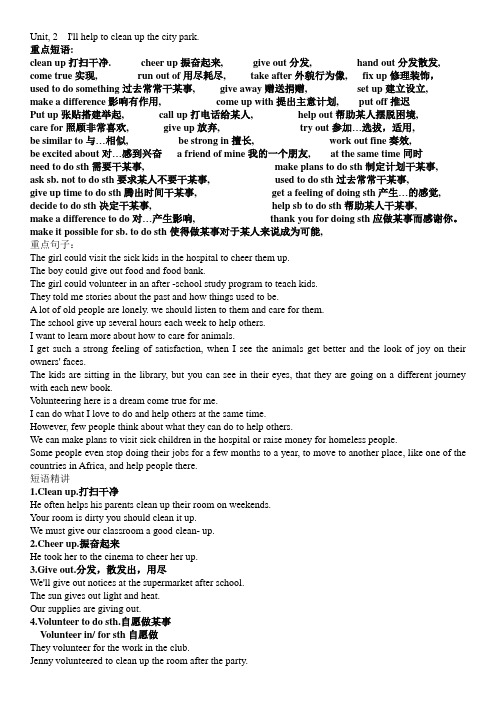
Unit, 2 I'll help to clean up the city park.重点短语:clean up打扫干净. cheer up振奋起来, give out分发, hand out分发散发, come true实现, run out of用尽耗尽, take after外貌行为像, fix up修理装饰,used to do something过去常常干某事, give away赠送捐赠, set up建立设立,make a difference影响有作用, come up with提出主意计划, put off推迟Put up张贴搭建举起, call up打电话给某人, help out帮助某人摆脱困境,care for照顾非常喜欢, give up放弃, try out参加…选拔,适用,be similar to与…相似, be strong in擅长, work out fine奏效,be excited about对…感到兴奋 a friend of mine我的一个朋友, at the same time同时need to do sth需要干某事, make plans to do sth制定计划干某事,ask sb. not to do sth要求某人不要干某事, used to do sth过去常常干某事,give up time to do sth腾出时间干某事, get a feeling of doing sth产生…的感觉, decide to do sth决定干某事, help sb to do sth帮助某人干某事,make a difference to do对…产生影响, thank you for doing sth应做某事而感谢你。
make it possible for sb. to do sth使得做某事对于某人来说成为可能,重点句子:The girl could visit the sick kids in the hospital to cheer them up.The boy could give out food and food bank.The girl could volunteer in an after -school study program to teach kids.They told me stories about the past and how things used to be.A lot of old people are lonely. we should listen to them and care for them.The school give up several hours each week to help others.I want to learn more about how to care for animals.I get such a strong feeling of satisfaction, when I see the animals get better and the look of joy on their owners' faces.The kids are sitting in the library, but you can see in their eyes, that they are going on a different journey with each new book.V olunteering here is a dream come true for me.I can do what I love to do and help others at the same time.However, few people think about what they can do to help others.We can make plans to visit sick children in the hospital or raise money for homeless people.Some people even stop doing their jobs for a few months to a year, to move to another place, like one of the countries in Africa, and help people there.短语精讲1.Clean up.打扫干净He often helps his parents clean up their room on weekends.Your room is dirty you should clean it up.We must give our classroom a good clean- up.2.Cheer up.振奋起来He took her to the cinema to cheer her up.3.Give out.分发,散发出,用尽We'll give out notices at the supermarket after school.The sun gives out light and heat.Our supplies are giving out.4.Volunteer to do sth.自愿做某事Volunteer in/ for sth自愿做They volunteer for the work in the club.Jenny volunteered to clean up the room after the party.I want to be a volunteer in the city.5.Put off doing sth推迟干某事They put off the match because of the heavy rain.Put up张贴, put back放回原处, put out熄灭, put down放下, put away.收起来放好put one's hear into全神贯注于某事, put on穿上,上演,发胖,6.Notice sb do /doing sth注意到某人做了/正在做某事Notice that.注意到I noticed Jim get into the teacher's office.I noticed some students getting off the bus when I walked past the school.She noticed that the old man had trouble breathing.e up with,提出,想出Can't you come up with a better idea?Come over过来顺便拜访, come on快点儿,加油, come out出来开花,出版,come up走进,走上前来, come down下来, come from来自, come true实现。
新目标八年级英语下册第二单元说课稿 Unit 2 I
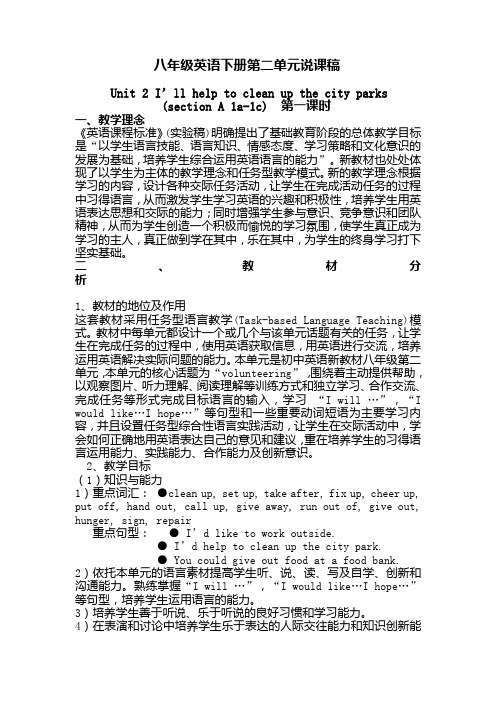
八年级英语下册第二单元说课稿Unit 2 I’ll help to clean up the city parks(section A 1a-1c) 第一课时一、教学理念《英语课程标准》(实验稿)明确提出了基础教育阶段的总体教学目标是“以学生语言技能、语言知识、情感态度、学习策略和文化意识的发展为基础,培养学生综合运用英语语言的能力”。
新教材也处处体现了以学生为主体的教学理念和任务型教学模式。
新的教学理念根据学习的内容,设计各种交际任务活动,让学生在完成活动任务的过程中习得语言,从而激发学生学习英语的兴趣和积极性,培养学生用英语表达思想和交际的能力;同时增强学生参与意识、竞争意识和团队精神,从而为学生创造一个积极而愉悦的学习氛围,使学生真正成为学习的主人,真正做到学在其中,乐在其中,为学生的终身学习打下坚实基础。
二、教材分析1、教材的地位及作用这套教材采用任务型语言教学(Task-based Language Teaching)模式。
教材中每单元都设计一个或几个与该单元话题有关的任务,让学生在完成任务的过程中,使用英语获取信息,用英语进行交流,培养运用英语解决实际问题的能力。
本单元是初中英语新教材八年级第二单元,本单元的核心话题为“volunteering”,围绕着主动提供帮助,以观察图片、听力理解、阅读理解等训练方式和独立学习、合作交流、完成任务等形式完成目标语言的输入,学习“I will …”,“I would like…I hope…”等句型和一些重要动词短语为主要学习内容,并且设置任务型综合性语言实践活动,让学生在交际活动中,学会如何正确地用英语表达自己的意见和建议,重在培养学生的习得语言运用能力、实践能力、合作能力及创新意识。
2、教学目标(1)知识与能力1)重点词汇:●clean up, set up, take after, fix up, cheer up, put off, hand out, call up, give away, run out of, give out, hunger, sign, repair重点句型:● I’d like to work outside.● I’d help to clean up the city park.● You could give out food at a food bank.2)依托本单元的语言素材提高学生听、说、读、写及自学、创新和沟通能力。
人教版新目标八年级英语第2单元Unit2教案
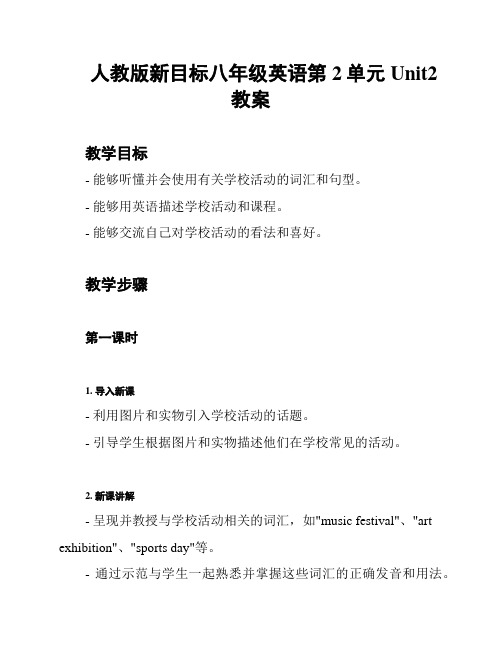
人教版新目标八年级英语第2单元Unit2教案教学目标- 能够听懂并会使用有关学校活动的词汇和句型。
- 能够用英语描述学校活动和课程。
- 能够交流自己对学校活动的看法和喜好。
教学步骤第一课时1. 导入新课- 利用图片和实物引入学校活动的话题。
- 引导学生根据图片和实物描述他们在学校常见的活动。
2. 新课讲解- 呈现并教授与学校活动相关的词汇,如"music festival"、"art exhibition"、"sports day"等。
- 通过示范与学生一起熟悉并掌握这些词汇的正确发音和用法。
- 操练这些词汇,并与学生一起编制句子来描述学校活动。
3. 听力训练- 播放关于学校活动的对话,要求学生仔细听并选择正确的图片。
- 学生互相对话,讨论听到的对话内容。
4. 对话练- 分组或两人一组,让学生模仿对话,表演关于学校活动的场景。
- 鼓励学生用英语进行自由对话,并互相分享自己参与过的学校活动。
5. 作业布置- 课堂分发作业卷,要求学生写一篇短文,介绍自己最喜欢的学校活动,并陈述原因。
第二课时1. 短文分享- 学生轮流与同桌分享自己写的短文。
- 鼓励其他学生提出问题或表达对短文的意见和建议。
2. 阅读训练- 学生阅读一篇关于学校活动的短文,并回答相关问题。
- 教师引导学生理解短文的内容,帮助他们解决阅读中遇到的问题。
3. 语法讲解- 教授句子结构"What do you think of + 学校活动?"和相应的答语。
- 帮助学生理解并掌握这种句子结构的用法。
4. 语法练- 学生分组或两人一组,互相提问"What do you think of + 学校活动?"并回答对方。
- 引导学生用所学词汇和句型互相交流和讨论自己对学校活动的看法和喜好。
5. 总结课堂内容- 教师带领学生回顾本节课所学的词汇、句型和语法。
2020年春人教新目标英语八年级下册Unit-2单元知识点讲解
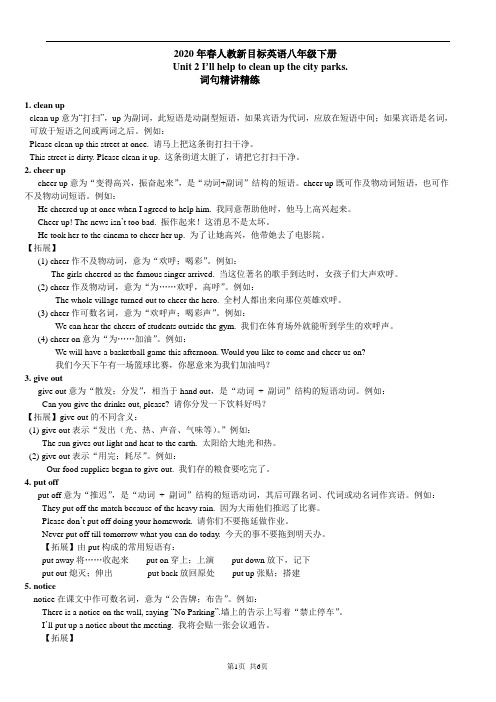
2020年春人教新目标英语八年级下册Unit 2 I’ll help to clean up the city parks.词句精讲精练1. clean upclean up意为“打扫”,up为副词,此短语是动副型短语,如果宾语为代词,应放在短语中间;如果宾语是名词,可放于短语之间或两词之后。
例如:Please clean up this street at once. 请马上把这条街打扫干净。
This street is dirty. Please clean it up. 这条街道太脏了,请把它打扫干净。
2. cheer upcheer up意为“变得高兴,振奋起来”,是“动词+副词”结构的短语。
cheer up既可作及物动词短语,也可作不及物动词短语。
例如:He cheered up at once when I agreed to help him. 我同意帮助他时,他马上高兴起来。
Cheer up! The news isn’t too bad. 振作起来!这消息不是太坏。
He took her to the cinema to cheer her up. 为了让她高兴,他带她去了电影院。
【拓展】(1) cheer作不及物动词,意为“欢呼;喝彩”。
例如:The girls cheered as the famous singer arrived. 当这位著名的歌手到达时,女孩子们大声欢呼。
(2) cheer作及物动词,意为“为……欢呼,高呼”。
例如:The whole village turned out to cheer the hero. 全村人都出来向那位英雄欢呼。
(3) cheer作可数名词,意为“欢呼声;喝彩声”。
例如:We can hear the cheers of students outside the gym. 我们在体育场外就能听到学生的欢呼声。
(4) cheer on意为“为……加油”。
人教新目标版八年级英语下册Unit2 (grammer-4c)课件

9.in one's free time 在某人的空闲时间里
few people think about what they can do __t_o_h_e_l_p__ others. There are many
help move do make visit spend
Most people today are only worried about getting good jobs _to__m_a_k__e lots of
8.be worried about doing sth\ sth担心做某事或某事
11.自愿利用我们的时间去帮助这些人是度过空闲时间的一种好方式。
___to__v_is_i_t __ sick children in the hospital or raise money for homeless people.
Some
people
even
stop
12.为无家可归的人筹钱
doing their jobs for a few
pfeewop表le示w否h定o a,r很e l少es,s l几uc乎k没y t有ha;naufesw. V表o示lu肯nt定ee,rin一g些our time to help these people
10.有很多比我们更不幸的人。
is a good way _t_o_s_p_en_d__ our free time. For example, we can make plans
圈出带有动词短语.
人教新目标英语八年级下册教学课件:UNIT 2 Section B 2a-2e(第4课时)
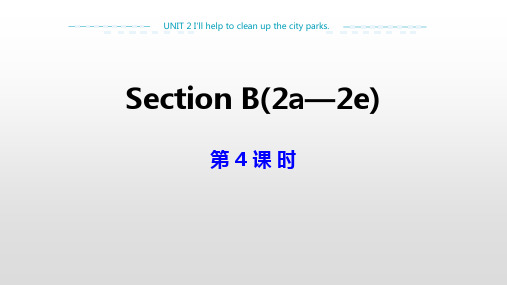
Imagine no possessions I wonder if you can No need for greedor hunger A brotherhood of man Imagine all the people Sharing all the world
Careful-reading
1.Why does the writer need a dog? Because he is disabled. He can’t use his arms or legs well, he can’t do normal things like...
answering the telephone opening and closing doors carrying things
Lucky is an amazing dog. I’ll send you a photo of him if you like, and I could show you how he helps me too one day. And so I thank you again for supporting “Animal Helpers”. It is very important that this
They have difficulties with many normal things.
We should help them, to show our kindness to them. Let’ s make a difference in our life. Let’s think up ways to help them.
2a How do you usually thank someone who helps you?
新目标(人教) 八年级下册英语教学课件 Unit2 Section B(2a-2e)
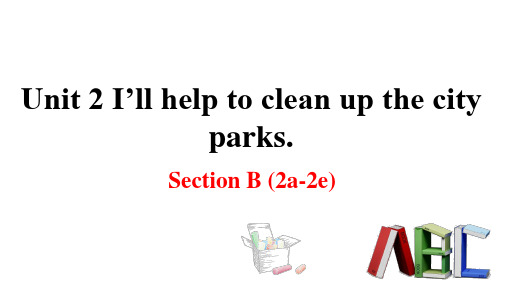
What would it be like to be blind or deaf? Or imagine you can’t walk or use your hands easily. Most people would never think avb. 想ou象t this, but many
How many kinds of letters do you know?
recommendation letter 推荐信
position-asking letter 求职信
thanks letter
Today we will read a thank-you letter from Ben Smith to Miss Li.
understands many English words. He can understand me when I give
order n. 指令;命令
立刻;马上
him orders. For example, I say, "Lucky! Get my book," and he does it at
Para.1引入主题
Dear Miss Li,
把某物给某人 give sth. to sb. =give sb.
主题句
sth. 当 sth.是代词时,只能用前者。
I’d like to thank you for giving money to Animal Helpers. I'm
因……而感谢你(们);for后面跟动词-ing作宾语。
make it + adj. + to do sth. 使做...变得...
人教新目标八年级英语下册Unit 2 知识点总结
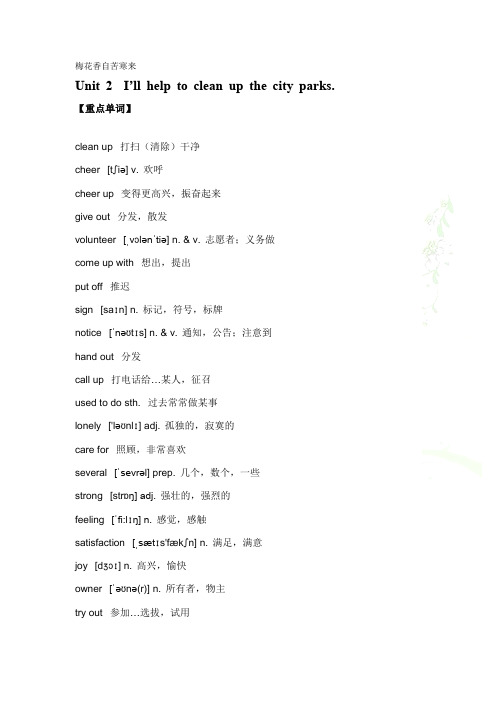
梅花香自苦寒来Unit 2 I’ll help to clean up the city parks.【重点单词】clean up 打扫(清除)干净cheer [tʃiə] v. 欢呼cheer up 变得更高兴,振奋起来give out 分发,散发volunteer [ˌvɔlənˈtiə] n. & v. 志愿者;义务做come up with 想出,提出put off 推迟sign [saɪn] n. 标记,符号,标牌notice [ˈnəʊtɪs] n. & v. 通知,公告;注意到hand out 分发call up 打电话给…某人,征召used to do sth. 过去常常做某事lonely ['ləʊnlɪ] adj. 孤独的,寂寞的care for 照顾,非常喜欢several [ˈsevrəl] prep. 几个,数个,一些strong [strɒŋ] adj. 强壮的,强烈的feeling [ˈfi:lɪŋ] n. 感觉,感触satisfaction [ˌsætɪs'fækʃn] n. 满足,满意joy [dʒɔɪ] n. 高兴,愉快owner [ˈəʊnə(r)] n. 所有者,物主try out 参加…选拔,试用journey ['dʒɜ:nɪ] n. (尤指长途)旅行,行程raise [reɪz] v. 抬起,举起,筹集,征集alone [əˈləun] adv. 独自地,孤独地repair [riˈpɛə] v. 修理,修补fix [fiks] v. 修理,安装fix up 修理,修补give away 赠送,捐赠take after (外貌或行为)像broken ['brəʊkən] adj. 破损的,残缺的wheel [wi:l] n. & v. 轮子,车轮;旋转letter [ˈletə] n. 信件,字母Miss [mɪs] n. 小姐set up 建立,设立disabled [disˈeibəld] adj. 有残疾的,丧失能力的make a difference 影响,有作用blind [blaɪnd] adj. 盲的,盲目的,失明的deaf [def] adj. 聋的imagine [ɪˈmædʒɪn] v. 想象,设想difficulty ['dɪfɪkəltɪ] n. 困难open [ˈəʊpən] v. 打开door [dɔ:] n. 门carry ['kærɪ] v. 携带,搬运train [treɪn] v. 训练,培养training [ˈtreɪnɪŋ] n. 训练,培训excited [ɪkˈsaɪtɪd] adj. 激动的,兴奋的kindness [ˈkaɪndnəs] n. 仁慈,善良,亲切,善意clever [ˈklevə] adj. 聪明的,机灵的understand [ˌʌndəˈstænd] v. 懂,理解change [tʃeɪndʒ] n. & v. 改变interest ['ɪntrəst] n. & v. 感兴趣;兴趣sir [sɜ:(r)] n. 先生madam ['mædəm] n. 夫人,女士【重点短语】1.Clean-Up Day 清洁日2. an old people’s home 养老院3. help out with sth. 帮助解决困难4. used to 过去常常......5. care for 关心;照顾6. the look of joy 快乐的表情7. at the age of 在......岁时8.clean up 打扫(或清除)干净9. cheer up (使)变得更高兴;振奋10. give out 分发;散发11. come up with 想出;提出12. make a plan 制订计划13. make some notices 做些公告牌14. try out 试用;试行15. work for 为…工作;为…. 效力16. put up 建造;举起;张贴17. hand out 分发;散发;发给18. call up 打电话;召集19. put off 推迟;延迟20. for example 比如;例如21. raise money 筹钱;募捐22. take after 与......相像;像23. give away 赠送;捐赠24. fix up 修理;修补;解决25. be similar to 与……相似26. set up 建立;设立27. disabled people 残疾人28. make a difference 影响;有作用29. be able to 能够30. after-school reading program 课外阅读项目【重点句型】1. The boy could give out food at the food bank. 这个男孩可以在食品救济站分发食物。
人教新目标英语八年级下册unit2 SectionA (3a-3d)课件

二、根据句意及首字母或汉语提示写单词。
1.This old man likes traveling but he can't stand
taking a long _jo_u__rn_e_y__by bus. 2.—Are you the _o_w__n_e_r__ of the car? —Yes,it's mine. 3.There are __s_e_v_er_a_l_ (几个) clubs in our school, such as reading club,music club and science club. 4.The boys jumped with __jo_y_ (快乐)when they
Volunteering here is a dream come true for her. 4.What do Mario and Mary volunteer to do? Mario volunteers at an animal hospital. Mary works at an afterschool reading program once a week to help kids learn to read.
to care for animals
当堂训练 15'
单项选择。
1.__B__ the age of 7, Bruce won the second prize in the piano competition. A.In B.At C.On D.For 2.Why don't you __A__ for the football team?You have nothing to lose. A.try out B.give out C.hand out D.come out
人教新目标版八年级英语下册Unit2SectionB2a-2e阅读课公开课课件
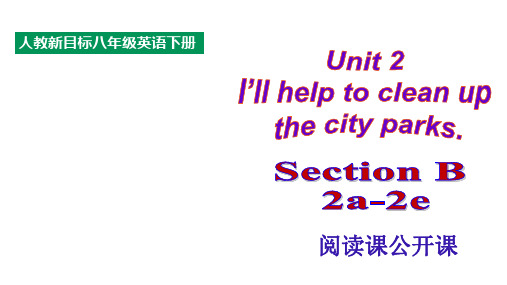
Careful reading
中考链接—做笔记
Read Para. 3﹠4 carefully and take notes.
1. Lucky is __B_e_n_’_s_d_o_g_’_s_n_a_m__e_. _____________________
2. Ben brought Lucky home after _s_i_x_m__o_n_th__s._____________
She gave money to animal Helpers, the
group was set up to help disabled people.
The general idea of the passage is about _a_t_h_a_n_k_l_e_tt_e_r_f_r_o_m__B_e_n_S_m__it_h__to__M__is_s_L_i_.
Lucky
Lucky makes _a_____b_i_g__d_if_fe__re__n_t_ to Ben’s life.
Let’s know more about the story of Ben Smith and Lucky.
Reading aloud
跟读录音,注意语音语调
I’d like to thank you for giving money to Animal Helpers. I’m sure you know that this group was set up to help disabled people like me. You helped to make it possible for me to have Lucky. Lucky makes a big difference to my life. Let me tell you my story. What would it be like to be blind or deaf? Or imagine you can’t walk or use your hands easily. Most people would never think about this, but many people have these difficulties. I can’t use my arm or legs well, so normal things like answering the telephone, opening and closing doors, or carrying things are difficult for me. Then one day last year, a friend of mine helped me out. She talked to Animal Helpers about getting me a special trained dog. She also thought a dog might cheer me up. I love animals and I was excited about the idea of having a dog, After six months of training with a dog at Animal Helpers, I was able to bring him home. My dog’s name is Lucky—a good name for him because I feel very lucky to have him. You see, I’m only able to have a “dog helper” because of your kindness! Lucky is very clever and understands many English words. He can understand me when I give him orders. For example, I say, “Lucky! Get my book”, and he does it at once. Lucky is a fantastic dog. I’ll send you a photo of him if you like, and I could show you how he helps me. Thank you again for changing my life.
人教新目标版英语八年级下册Unit2SectionA(GrammarFocus-4c)课件
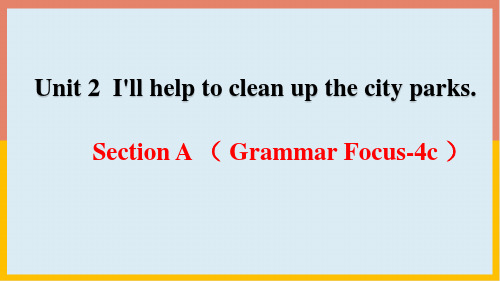
Revision
Retell the article according to the information below.
Beginning: Mario Green and Mary Brown from … give up…
Mario:
Mary
Mario loves ... and wants to be … He volunteers at … He believes it can … to … “It’s hard work,” … “but I want to … I get such a … of … when I see … and …”
Grammar
1)有些动词如 ask, teach, tell, advise, invite 等后必须 接带to的动词不定式作宾语补足语。如: ➢The teacher asks us to come to school early. 老师要求我们早点到校。 ➢I tell him to arrive on Sunday. 我让他周日到达。
Grammar
2) 感官动词(hear, see, watch等)和使役动词(make, let等)后接不 带to的动词不定式作宾语补足语。如: My parents sometimes make me do some housework. 我父母有时让我做些家务活。 3) help后面的动词不定式可加to,也可不加to。如: Could you help me (to) do some cleaning? 你能帮我打扫卫生吗?
新目标(人教) 八年级下册英语教学课件 Unit2 Section B(1a-1e)
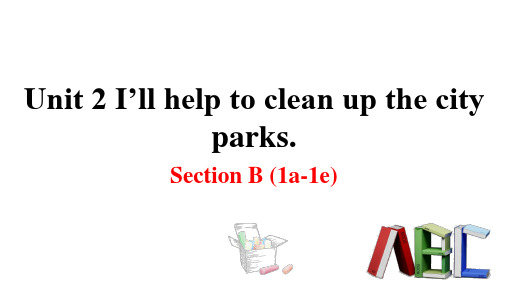
I guess so. But I’ve run out of my money, so I can’t buy any more old bikes. I need to come up with some way of getting money or I’ll have to stop.
1.I’ve run out of it. run out of = use up 意为“用完”、“卖光”。
2. What’s Jimmy doing?
b He is fixing up the bike.
1. What does the boy find? He finds an abandoned(废弃的) bike.
2. Does the bike have a broken wheel?
c Yes, it does.
➢ Have you ever helped others as a volunteer?
➢ What do you want to do if you are a volunteer ?
1a Match the sentences with similar meanings.
__b__ 1. I’ve run out of it.
my bike money my father old clothes
I gave away my bike to a children’s home. _I_h_a_v_e__r_u_n_o_u_t__o_f _m_o_n_e_y__d_u_r_i_n_g_m__y_v_a_c_a_t_ion. _M__y_b_r_o_t_h_e_r_t_a_k_e_s_a_f_te_r__m_y__f_a_th_e_r_._______ _I_f_ix_e_d__u_p__m_y__b_ik_e__y_e_s_te_r_d_a_y_.___________ _I_d_e_c_id_e_d__t_o_g_i_v_e_a_w_a_y__m__y_o_l_d_c_l_o_th__es__to___ _th_e__c_h_il_d_r_e_n_’s__h_o_m_e_.___________________ ____________________________________ …
新目标英语八年级下第2单元知识点
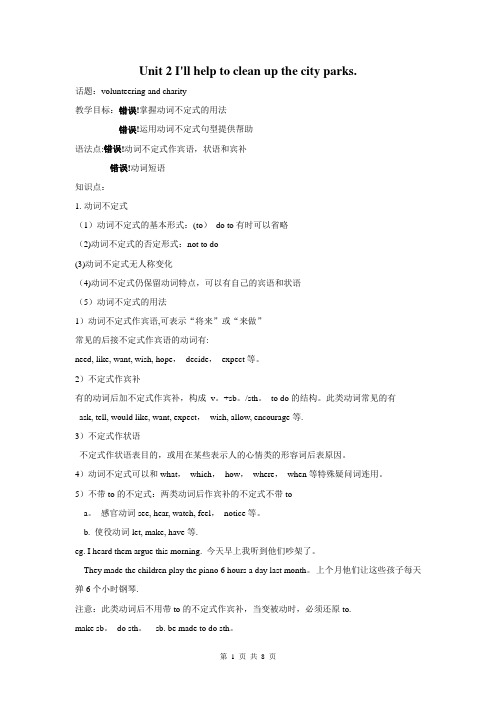
Unit 2 I'll help to clean up the city parks.话题:volunteering and charity教学目标:错误!掌握动词不定式的用法错误!运用动词不定式句型提供帮助语法点:错误!动词不定式作宾语,状语和宾补错误!动词短语知识点:1.动词不定式(1)动词不定式的基本形式:(to)do to有时可以省略(2)动词不定式的否定形式:not to do(3)动词不定式无人称变化(4)动词不定式仍保留动词特点,可以有自己的宾语和状语(5)动词不定式的用法1)动词不定式作宾语,可表示“将来”或“来做”常见的后接不定式作宾语的动词有:need, like, want, wish, hope,decide,expect等。
2)不定式作宾补有的动词后加不定式作宾补,构成v。
+sb。
/sth。
to do的结构。
此类动词常见的有ask, tell, would like, want, expect,wish, allow, encourage等.3)不定式作状语不定式作状语表目的,或用在某些表示人的心情类的形容词后表原因。
4)动词不定式可以和what,which,how,where,when等特殊疑问词连用。
5)不带to的不定式:两类动词后作宾补的不定式不带toa。
感官动词see, hear, watch, feel,notice等。
b. 使役动词let, make, have等.eg. I heard them argue this morning. 今天早上我听到他们吵架了。
They made the children play the piano 6 hours a day last month。
上个月他们让这些孩子每天弹6个小时钢琴.注意:此类动词后不用带to的不定式作宾补,当变被动时,必须还原to.make sb。
do sth。
sb. be made to do sth。
- 1、下载文档前请自行甄别文档内容的完整性,平台不提供额外的编辑、内容补充、找答案等附加服务。
- 2、"仅部分预览"的文档,不可在线预览部分如存在完整性等问题,可反馈申请退款(可完整预览的文档不适用该条件!)。
- 3、如文档侵犯您的权益,请联系客服反馈,我们会尽快为您处理(人工客服工作时间:9:00-18:30)。
U2. What should I do?第一二课时:短语:keep out want sb to do sth argue with sb out of style write sb a letter call sb(up)talk about sth on the phone 通过电话/打电话best friend pay for borrow sth from sb join a club the same as ... the same age as ...in style tell sb to do sth be popular with/at find out let’s do sth invite sb to do sth be angry with sb fail the exam get on well have a fight with sb after school 放学后it’s time to do sth=it’s time for sth 是做...的时候了Under too much pressure 压力过大compain about sth/doing sth 抱怨做某事take part in 参加on the one hand 在一方面on the other hand 在另一方面should①should m.v. shouldn’tYou should take good care of your younger sisiterYou should study hard.②Can could must may have to minght will wouldwant(would like) sth/to do sth/ sb to do sthMy parents wants me to stay at home very night.I would like my parents to give me more pocket money.feel like doing sthplay 用法总结:1vt. 播放(唱片,音响,录音机等)Play the tape/records/radio/CDs2.vt.演奏/弹奏/吹奏/(乐器)Play the violin/guitar/3.v. 玩/打/踢、Play basketball/football/computer games play with sb/sth4.n.戏剧/剧本TV play watch the play === playeraloud loud loudlyaloud adv.1. (1) 强调“出声”,即把话说出来,而不是在心里默默地“说”,通常与动词read, speak, think 等动词连用。
如:read aloud 朗读think aloud 自言自语地说(2) 表示“大声地”,通常与动词cry, laugh, shout, call 等动词连用,如:The boy is crying aloud. 这男孩子在大声哭。
She called aloud for help. 她大声呼救。
2. loud 表示“大声”或“响亮”,可用作形容词和副词:(1) 用作形容词。
如:He has a loud voice. 他嗓子大。
The music is too loud; please turn it down. 这音乐太吵人了,请把音量关小一点。
(2) 用作副词(与loudly 同义),一般只与动词speak, talk, laugh, sing 等连用,且必须放在这些动词之后。
如:I can’t hear you, please speak louder. 我听不见,请说大声些。
3. loudly 只用作副词(与用作副词的loud 同义)。
如:Don’t talk so loudly [loud]. 别这么大声讲话。
注:loudly 比用作副词的loud 使用范围更广,它除与speak,talk,laugh 等动词连用外,还可与其他表示声响的动词连用,且可以放在这些动词之前或之后。
如:The man snored loudly. 这个人鼾声打得响。
He heard a cocklock loudly crow. 他听见雄鸡大声啼叫。
另外,在用于比较级或最高级时,通常用loud,而不用loudly。
如:Who laughed loudest? 谁笑的声音最大?EnoughEnough adj. 足够的,充分的;作形容词时既可位于名词之前也可位于名词之后.One yuan is enough. We have enough water. We have water enough.Five bottles are enough. Do you have enough time/moneyAdv. 足够;充分;修饰形容词或副词时位于形容词副词之后。
Tom is old enough to go to school.This chair is not strong enough.It is warm enough in this room.He runs fast engough to catch up with his brother.Adj. Enough for sb/sth to do sth. .....足够....做某事It is late enough for us to stop work. It is old engough for the boy to go to school.discuss with sb 与某人讨论argue with sb 与某人争论过去式quarrel with sb 与某人吵架fight with sb 与某人打架Be angry with sb 生某人的气argue about/over sthargue with sb about/over sthtalk about sth with/to sbwhat’s wrong/the troubel/problem/matter with sb?There is something wrong with....I don’t want to surprise him.1.want to do sth2.surprise vt.使...某人惊奇The result surprises all of us.The news surprise me.n.惊奇I hope to give my mother a pleasant surprise.surprising adj. 令人惊奇的修饰物定语/表语He is a surprising man.surprised adv.感到惊奇的表语be surprised at sthwe are surprised at what he do.The grades are really surprising.Interesting interested tiring tired excited exciting shocked shockingin surprise/to one’s surprise 讲解To my surprise, he didn’t arrive at school late today.He looked at me in surprise.Maybe you should call him up.1.maybe2.call/ring sb(宾格) (up) please tell him to call me up when he get to Shanghai.3.ring/telephone/phone sb4.give sb a call/ring/ call sb on the phoneon the phone 通过电话/接电话I need to get some money to pay for summer camp.Needget some moneypay forpay for sth.. 为...付款/pay some money for sth 为...付多少款...He doesn’t want to treat me.I have to pay for this ice cream.I have to pay five yuan for this ice cream.spend 上面句子同意替换。
costtakeeither1.表示也(不)adv. 用于否定句或否定词组中。
He is not good at playing basketball. I am not, either.2.Adj. 任一的;(两方中)任何一方的3.Pron. 两者之一。
4.conj. either...or....too either alsotoo 表示也,肯定句either 否定句also 肯定句实义动词前be/助/情之后John can also skate.I study hard. She also study hard.ask for sth 向某人请求He asks for helpHe asks me for help.5.joinjoin in =take part injoin sb/组织/群体/团体6.提建议的方式;7.A the same as BA be different from beA the same sth as BThe clothes have the same color with mine.7.前缀inexpensive inpossible incorrect in direct8.find out look for findfind是个及物动词,表示找到,主要强调“寻找”的结果,而不表示“寻找”的过程。
I have found my watch. 我找到了我的表。
look for 表示“寻找”的过程和动作。
例如:What are you looking for? 你在找什么?They were looking for their teacher everywhere,at last they found him at the library.他们到处寻找老师,最后在图书馆找到了他。
find out是个短语动词,表示“搞清楚”、“弄明白”的意思,而且是经过研究、计算、探询等获知,得知。
例如: Please find out when the train starts. 请查明火车什么时候开。
